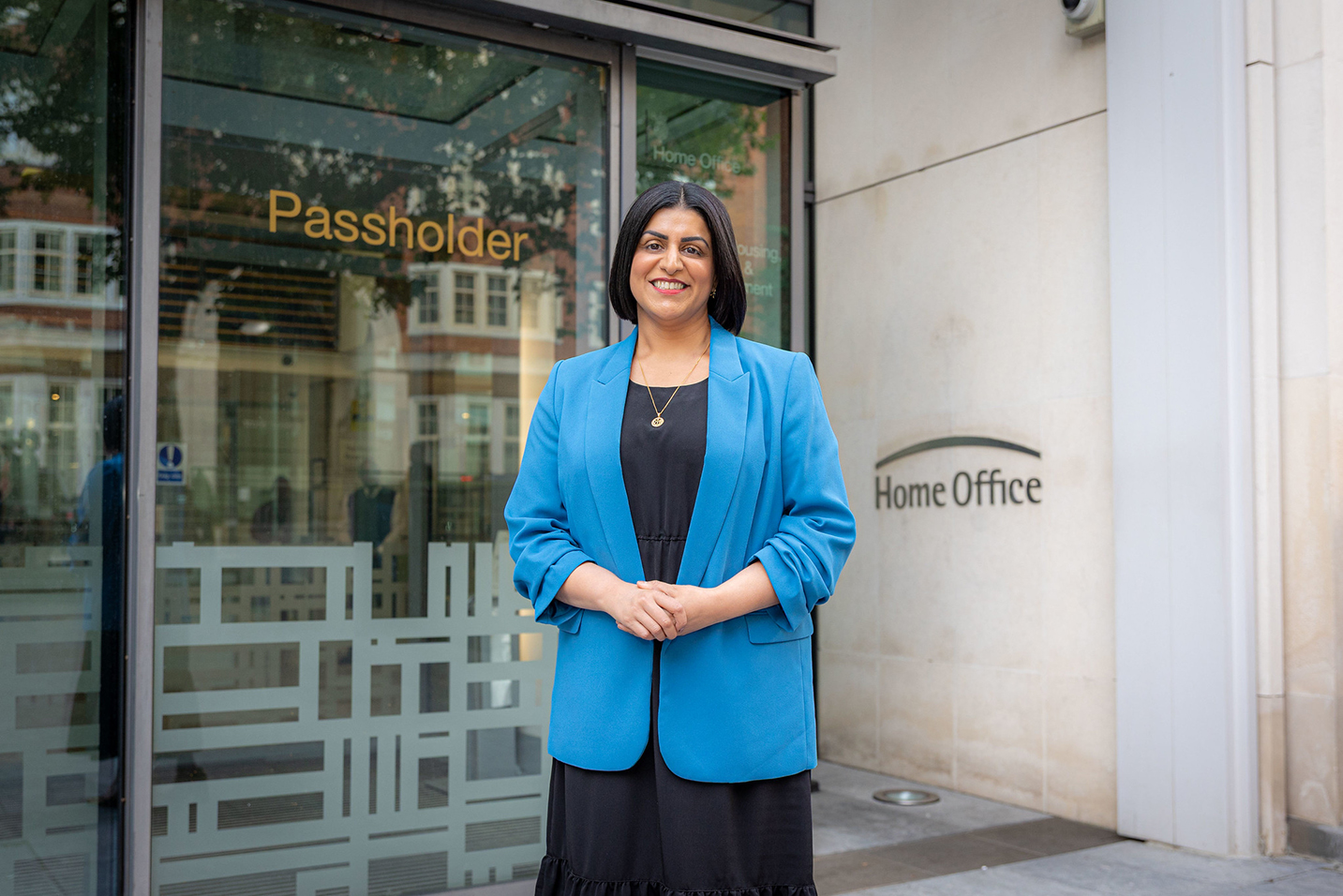
Abu Yusra Choudhury
The appointment of Shabana Mahmood as Britain’s first Muslim woman Home Secretary, elevated by Sir Keir Starmer in his first reshuffle, marks a historic breakthrough, one immediately clouded by critics who have used Islamophobic tropes to question her loyalty.
She assumes the role during a period of profound turbulence for the Home Office, defined by rising small boat crossings, unrest over asylum hotels, weekly protests linked to the Gaza war, and far-right demonstrations.
The Birmingham MP, the daughter of Pakistani parents, has promised “firm law enforcement” and a commitment to keep Britain safe. Yet her record on Palestine, her Muslim identity, and even her Pakistani heritage are already being scrutinised and weaponised by opponents.
Shadow Conservative Home Secretary, Chris Philp, raked through her past social media remarks, accusing Mahmood of branding English flag-bearers “bad people”. In fact, her comments in 2011 targeted far-right English Defence League demonstrators: “The people you see holding the English flag most of the time down my neck of the woods will be the EDL… and they’re bad people.” She later added, “I would like us to claim our flag back from the bad guys.”
Meanwhile, Shadow Equalities Minister, Claire Coutinho, took to X to criticise Mahmood’s endorsement of the All-Parliamentary Group on British Muslims’ proposed definition of Islamophobia and support for the mainstream Muslim Council of Britain. Opposition to both has been nurtured into dog-whistle shibboleths for the right and far-right. This is the same faction that enthusiastically endorses the International Holocaust Remembrance Alliance (IHRA) definition on antisemitism while maintaining close relations with pro-Israel groups such as the Board of Deputies.
Shabana Mahmood, the new Home Secretary, will now influence the Government's definition of Islamophobia.
— Claire Coutinho (@ClaireCoutinho) September 5, 2025
She has previously supported the Muslim Council of Britain, and endorsed the dangerous APPG definition of Islamophobia.
I hope she has since taken a more sensible position. pic.twitter.com/EZknqCs8LO
Deploying the very conspiratorial tropes about supposed Muslim takeovers, Conservative Whip, Nick Timothy, asked Shabana Mahmood in Parliament “Does she still believe that addressing the religion of rape-gang members or identifying Muslim Brotherhood entryism is Islamophobic, or does she now disown that definition?” Earlier this year, Timothy claimed in Parliament that: “Islamophobia is a made-up and nonsensical concept”.
Born in 1980 in Birmingham, Mahmood read law at Lincoln College, Oxford, before qualifying as a barrister. She was elected Labour MP for Birmingham Ladywood in 2010, becoming one of the first female Muslim MPs in Britain. Over the years, she has served in a string of frontbench roles. After Labour’s 2024 general election victory, she was appointed Justice Secretary and Lord Chancellor. There, she gained a positive reputation for tackling a prison overcrowding crisis and by pushing back against judicial leniency. Starmer has now rewarded her with one of the most demanding jobs in government.
Immigration and law and order will dominate her tenure. With public trust in the asylum system collapsing, insiders told The Telegraph she is expected to take a harder line than her predecessor, Yvette Cooper. A source told the paper that she “will be able to deliver some tough messages around immigration because of her Pakistani heritage, which Yvette Cooper might have found much harder”. In an interview with The Spectator, Mahmood herself explained: “If you ask my constituents, they want a fair managed migration system. They think there should be rules… I just don’t know why we’ve got ourselves in a tangle talking about migration controls on the left of politics, because it’s really pretty fundamental to the way a lot of our voters think.”
That message may resonate in her constituency of Birmingham Ladywood, which is 70 per cent non-white, but it also underscores the paradox of her position: her heritage is invoked both as a shield to sell tough immigration policies, and as a reason for critics to cast doubt on her loyalty. Mahmood is said to identify with the Blue Labour wing of the party, describing herself as “social, small-c conservative” and citing “faith, family and flag” as her natural touchstones. Though how this tallies with the Blue Labour movement’s reactionary views on Muslims and Palestine remains to be seen.
The fiercest reaction has come from pro-Israeli and anti-Palestinian commentators. Mahmood has long described herself as “a passionate supporter of Palestinian rights.” She took part in a 2014 demonstration in Birmingham that forced a Sainsbury’s to close over goods from Israeli illegal settlements, later reportedly saying, “We managed to close down that store at peak time on a Saturday. This is how we can make a difference.”
The Jerusalem Post highlighted her past appearances at Palestine Solidarity Campaign rallies and her abstention on the vote to proscribe the activist group Palestine Action. It noted she must now enforce that very ban as Home Secretary, with hundreds already arrested under terror laws.

The paper also pointed to her links with Islamic Relief Worldwide, an international aid organisation based in Mahmood’s constituency that has been the target of disinformation from Israel-backed anti-Palestinian groups who specialise in discrediting Muslim civil society. In contrast to Suella Braverman, who had branded pro-Palestinian rallies “hate marches”, it also quoted senior Jewish figures who described her as a “steadfast ally… in the fight against antisemitism” during Jeremy Corbyn’s leadership.
Not all reactions have been hostile. Lord Michael Gove, former Conservative cabinet minister and Editor of The Spectator, has praised Mahmood as “even sharper” than some of Labour’s most admired rising stars. He described her as a politician with “a totally coherent worldview” who embodies the Labour coalition.
Several Jewish community figures also vouched for her impartiality. One Labour MP told the Jewish Chronicle that Mahmood was a “long-standing ally of the Jewish community” who supported both “a safe and secure Israel alongside a sovereign Palestine.” Mahmood herself insists that her faith guides her towards public service rather than sectarianism. “My faith is the centre point of my life and it drives me to public service, it drives me in the way that I live my life,” she told The Sunday Times.
Beyond Israel-Palestine, other groups have piled on. Some Indian nationalist outlets accused Mahmood of being “anti-Indian” for previously calling Kashmir “India-occupied.” On social media, far-right figures deployed openly Islamophobic rhetoric. One widely shared post on X declared, “If new Home Secretary Shabana Mahmood had to choose between her religion and the British people, it’s obvious which she’d choose.” Others cast doubt on whether she was “really Muslim” at all, accusing her of being either too devout or too secular — a double bind common for Muslim politicians.
While commending her appointment, the Muslim campaigning group MEND cautioned, “We hope the choice is neither tokenistic nor, worse a cynical attempt to cover over the government’s failings towards ethnic minorities, the working classes and causes of Justice like the genocide in Palestine. We hope her background and stated aim of protecting citizens will mean she will prioritise tackling the rising tide of Islamophobic attacks and their causes in the policies of the far right.”
Amidst rising hostility and violence against Muslims during the summer, Baroness Shaista Gohir, CEO of the Muslim Women’s Network wrote to the Home Secretary calling for Mahmood to ‘Publicly condemn all racially and religiously motivated violence and abuse and reassure minority communities and Muslims their safety matters.’ She called for greater government action on the immigration debate sweeping Britain at the moment: “The ongoing immigration debate can be informed and constructive without compromising the safety of individuals whether they are British born, long-established citizens, recent migrants, or awaiting immigration decisions. A government can be both firm on immigration policy and firm in its stance against racism and anti-Muslim hatred.”
Britain’s first Muslim woman Home Secretary, therefore, faces a formidable balancing act. Every decision on immigration or protest policing will be scrutinised for bias, and every personal link questioned. She must prove that she can enforce the law “without fear or favour,” even while being targeted with prejudice and suspicion. As she told her constituents after observing a recent protest: “Supporting Palestine and supporting a proscribed terrorist group are not the same thing.” In that careful distinction lies the challenge of her tenure — upholding both the rule of law and the principles of fairness that define her politics.
Feature photo: September 5, London, UK: Newly appointed Home Secretary Shabana Mahmood arrives at the Home Office for the first time after her historic appointment. (Credit: Jonathan Chen/Home Office)


